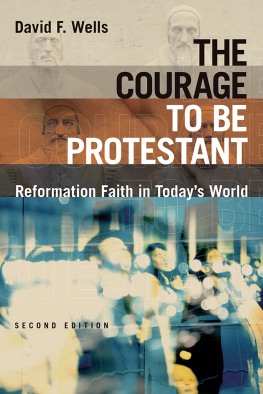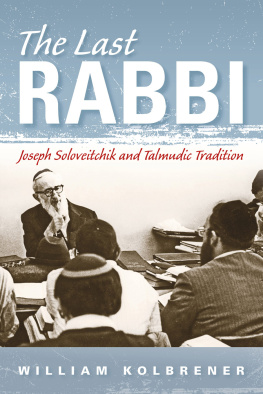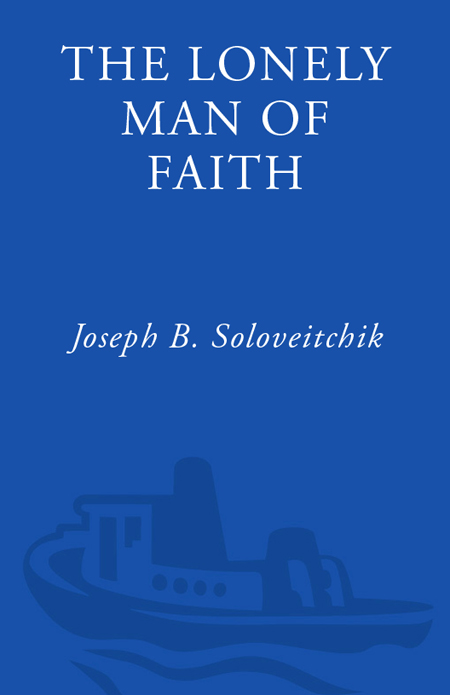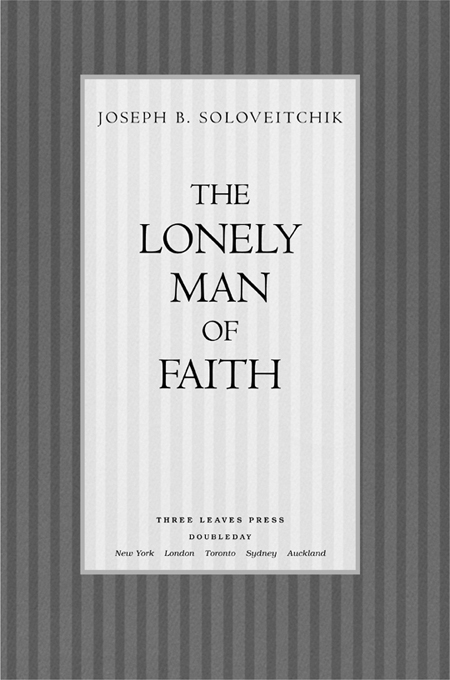FOREWORD
David Shatz, Professor of Philosophy, Yeshiva University
RABBI JOSEPH B. SOLOVEITCHIK (190393) was not only one of the outstanding Talmudists of the twentieth century but also one of its most creative and seminal Jewish thinkers. His stature was such that he was widely known simply as the Ravthe Rabbi par excellence. Drawing from a vast reservoir of Jewish and general knowledge, Rabbi Soloveitchik brought Jewish thought and law to bear on the interpretation and assessment of the modern experience. On the one hand, he built bridges between Judaism and the modern world; yet, at the same time, he vigorously upheld the integrity and autonomy of the Jews faith commitment.
Nowhere in his writings does this dual, tensile, dialectical approach to modernity burst forth as powerfully as in Rabbi Soloveitchiks The Lonely Man of Faith a work characterized by one writer as one of the most theologically The essay was originally published in 1965 in Tradition, a journal of Orthodox Jewish thought. But it is by no means parochial or sectarian. On the contrary, it speaks to the predicament of all men and women of faith, or at least adherents of Western religions. Significantly, references to Judaism and Jewish sources crop up in the essay almost exclusively in footnotes, while the text is cast, predominantly, in universal terms.
No prcis can fully capture the richness of the work, nor can it project the deeply personal character of the Ravs writing, the passion that infuses every page, and the moral sensibility that shines through. These qualities must be experienced, not expounded. Let me nonetheless try to frame the essays basic argument and assess its relevance to the twenty-first century.
AT THE VERY outset the author makes clear that he is not engaging the standard intellectual challenges to traditional religion. Evolution, the reduction of mind to matter, biblical criticismnone of these are on his agenda. Rather, his project is religious phenomenology, the description of religious experience; or, alternatively worded, religious anthropology, the study of what a religious personality is like. Rabbi Soloveitchik wants to discern The person of faith feels lonely, estranged, alienated. What is the precise source of this loneliness, and can the feeling be overcome?
As an entre into these questions, Rabbi Soloveitchik beginsin a time-honored mannerby raising a difficulty in a biblical text. In the opening of Genesis, there appear to be two different and contradictory accounts of the creation of Adam, one in chapter one of Genesis and the other in chapter two. For Rabbi Soloveitchikas distinct from biblical critics who posit two different traditionsthe answer lies not in an alleged dual tradition but in dual manin a real contradiction in the nature of man.
Who are these two Adams, signifying two opposing aspects of the human personality?indeed mandated; for God wills that he create and that he master his environment. Adams creativity manifests the image of God within him.
But Adam the Second has different goals. To begin with, he is interested not in how things work but in why the cosmos exists at all and what message it carries. In his inner life, furthermore, he experiences loneliness, by which Rabbi Soloveitchik means an awareness of his differentness and uniqueness, which entail an inability to communicate his experience. One can be lonely (in this sense) even while not alone. Adam the First never sensed loneliness; for him, having coworkers in assembly-line fashion was enough to create a community. Adam the Second seeks not the functional utilitarian community of Adam the First, dedicated to the production and distribution of goods, but a covenantal faith community that involves a deep and intimate relationship with other human beingsand with God. He thirsts for redemptiondiscipline, control over ones selfand even wishes to be overpowered by God.
Because both personality types are willed by God, the human being must attempt the seemingly impossibleto be part of both communities, the utilitarian and the covenantal. Thus, God bids the human being to live in a dialectical fashion, oscillating between creative, victory-bent man and humble, submissive man. A person cannot throw off either part of his or her personality. In every one of us abide the two personae. And here is the rub: the need for oscillation means that the man of faith has no single home. He is a wanderer, striking roots in one community, only to then uproot himself and travel to another, in a perpetual cycle. This continuous oscillation is a source of lonelinessand it cannot be overcome. Because Adam the Second must, by divine mandate, enter Adam the Firsts community as well, complete redemption is unattainable.
Rabbi Soloveitchik believed, as he wrote in 1944, that religion is not, at the outset, a refuge of grace and mercy for the despondent and desperate, an enchanted stream for crushed spirits, but a raging, clamorous torrent of mans consciousness with all its crises, pangs and torments.
THIS, IN THUMBNAIL form, is the dynamic of one type of loneliness that Rabbi Soloveitchik identifies in religious life. Before we turn to analyze another type of loneliness, let us reflect on the significance of Adam the First.
Rabbi Soloveitchiks endorsement of Adam the Firsts creative activities says, in essence, that engaging in general culture is neither religiously neutral nor antithetical to faith. Rather, the quest for majesty and dignity is built into human nature and is required by God. The Deity wants man to engage in the pursuit of majesty-dignity. Of the various activities of Adam the Firstscientific, political, aestheticRabbi Soloveitchik is most struck by medical advances and technological achievements like space travel (the essay dates from the age of Sputnik). For him the value of these endeavors is that they enable human beings to achieve dignity, fulfill their responsibilities, and indeed expand the scope of those responsibilities (for example, only if you can cure a disease do you have the responsibility to cure it). One might even insist that Adam the First is not necessarily motivated by religious goalshe may be a secular man, even though many of his objectives and actions can be justified by religious and ethical considerations.
By ratifying Adam the Firsts labors, Rabbi Soloveitchik blunts a widespread criticism of religion, that it takes no interest in or even opposes secular endeavors; and by the same token he rejects views held by religious thinkers who see no religious significance in cultural developments. I hardly believe, writes the Rav, that any responsible man of faith, who is interested in the destiny of his community and wants to see it thriving and vibrant, would recommend now the philosophy of contemptus saeculi. The Halakha, Jewish law, is brought to bear on Adam the Firsts community; the Halakha believes that there is only one worldnot divisible into secular and hallowed sectors. These are ringing endorsements of Adam the Firsts efforts. Naturally, one can depict a house of horrors wrought by technology, but Rabbi Soloveitchik is speaking of scientific endeavor guided by moral (and halakhic) values and therefore appropriately controlled.
AND YET, NOTWITHSTANDING his praise for Adam the First, Rabbi Soloveitchik believes that in contemporary times Adam the First is to blame for a new type of loneliness afflicting the man of faith. This type of loneliness is due not to the permanent nature of the human condition (ontological loneliness), which requires oscillation between two communities, but to specific man-made historical circumstances, the circumstances of modernity. Contemporary Adam the First rejects his dialectical nature. He regards himself as the totality of the human personality. He is narcissistic, arrogant, demonic. He cannot hear Adam the Second; he dismisses the covenantal faith community as something superfluous and obsolete; he ignores the unique and strange transcendental experience which resists subservience to the cultural interests of majestic man. This is not to say that contemporary Adam the First has no religion. He may well attend a house of worship and participate vigorously in institutionalized religion. But in Rabbi Soloveitchiks analysis, he seeks a religion that caters to his interests; he is searching not for a faith in all its singularity and otherness, but for religious culture. He wants from his religion serenity, not sacrifice; comfort, not commitment; an aesthetic experience, not a covenantal one. Yes, the man of faith can translate a portion of his outlook into cultural categories, and indeed is obliged to reach out in this way to Adam the First, to impart some component parts of his transcendental experience. But this is not to impart faith itself. The latter cannot be reduced to cultural categories. And so, tragically, the dialogue between the Adams comes to an end.







